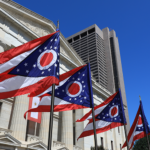Washington state collective bargaining laws make it easy for unions to organize public employees but difficult for the employees to ever change unions or decertify. However, with the Freedom Foundation’s assistance, a group of state workers in the Real Estate Services Division of the Department of Transportation (DOT) managed to do just that in April.
For many years, the bargaining unit of about 80 people had been represented by Professional and Technical Employees Local 17 (PTE 17).
Recently, however, employees began to question the value of the union’s representation.
“Many of us simply felt like the service we were getting from the union wasn’t worth the dues we paid every month,” said employee Michelle Newlean, who filed the decertification petition. “When we brought our concerns to the union, too often we were met with eye rolling and insufficient answers.”
Newlean and a number of her co-workers wanted to decertify PTE 17, but weren’t sure how to go about it. Unlike political elections, current state law doesn’t provide public employees with the ability to regularly vote on their union representation.
Instead, the employees have to initiate an election by gathering signature cards calling for a vote from at least 30 percent of the bargaining unit. All the signatures and paperwork must be submitted during a 30-day window period once every contract cycle — in this case, every two years. If successful, the state Public Employment Relations Commission (PERC) will conduct an election.
While union lawyers are intimately familiar with the process and know how to fight a decertification effort, employees are left to try and navigate a foreign process on their own.
That’s why Newlean and her colleagues reached out to the Freedom Foundation for help.
“The Freedom Foundation was indispensable in helping us understand how to decertify,” she said. “They guided us through every step of the way and made a process that can be somewhat confusing and intimidating far more manageable. Their support really made the difference and allowed us to get rid of a union that we felt no longer represented our interests.”
After gathering the necessary signatures, Newlean submitted her petition to PERC during the March filing period. In this case, however, instead of moving forward with a contested election, PTE 17 instead decided to “disclaim interest” in the bargaining unit, surrendering its certification without a vote.
Under state law, had the election gone forward and the union lost, no union, including PTE 17, could have attempted to re-unionize the bargaining unit for at least a year. However, by disclaiming interest in the bargaining unit, PTE 17 may attempt to recapture the employees in only six months. If the union does attempt to win the employees back, it will likely happen without an election.
As Newlean informed her colleagues, union organizers can utilize the “cross check” process to attempt to pressure individual employees to sign union cards one-on-one. If they can gather cards from a majority of the bargaining unit, the union can be recertified as the exclusive bargaining representative automatically, without a secret-ballot vote.
Still, as of April 17, PERC withdrew PTE 17’s certification and the bargaining unit is currently union-free.
Even though they are no longer union-represented, the DOT property acquisition specialists are still covered by an array of workplace protections provided in Washington’s Civil Service laws (Chapter 41.06 RCW) and regulations (Title 357 WAC). Their salary schedule is no different than it was under the union contract and any raises will still have to be awarded by the state legislature.
While it is possible for employees to change unions or decertify under current law, much more needs to be done to give public employees more control over their workplace representation and make unions behave less like unaccountable monopolies. One such reform supported by the Freedom Foundation would require PERC to conduct automatic union elections for public employees every few years.
After experiencing it firsthand, Newlean agrees the process could be improved to give employees more control. “I’m not categorically opposed to unions,” she noted, “but they need to be more accountable to the workers they’re supposed to represent.”










